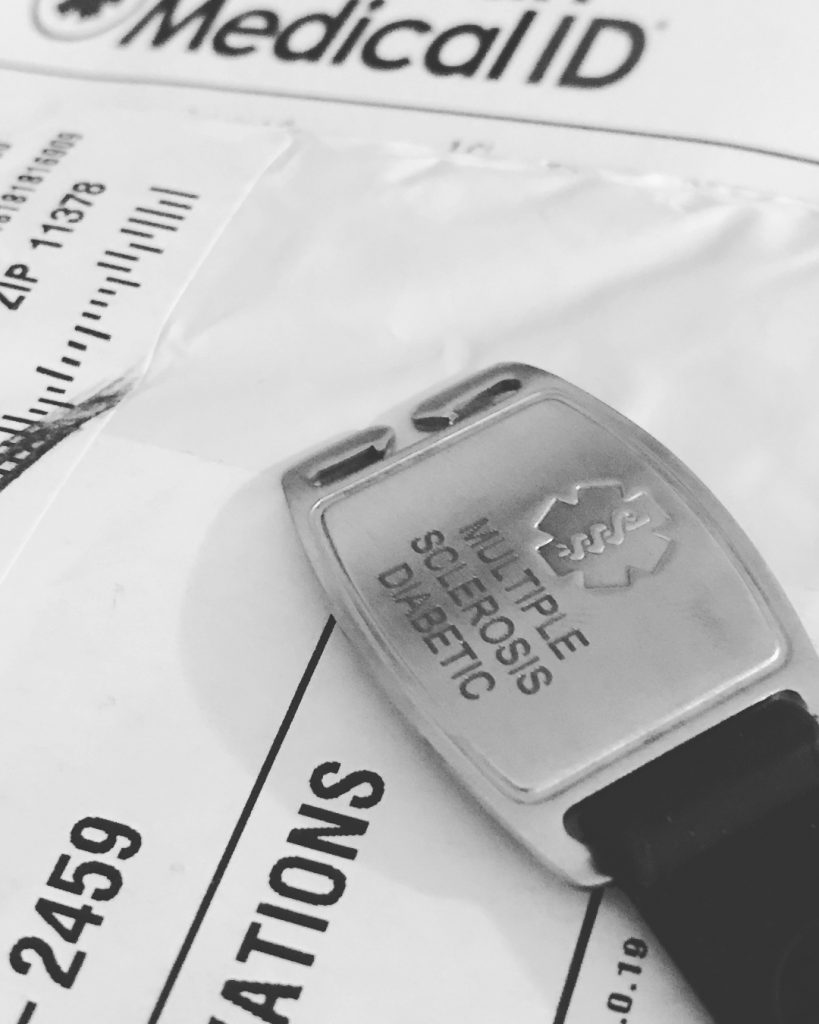
A medical ID is recommended to anyone living with a medical condition such as Multiple Sclerosis. Photo credit: Kiki Charles
The hardest thing for me about multiple sclerosis (MS) is its unpredictability.
At age 36, I escaped from an abusive relationship and rebuilt my life. By age 44, I was traveling the world thanks to a career I loved, and I married Randy – the man I knew would be the love and friend of my lifetime. Life never looked better.
When I Began to Notice the Signs of MS
One day, the right side of my face scrunched up in spasm. My primary physician sent me to the ER, to rule out any chance of stroke.
Three hours later, a doctor closed the door and said to Randy and I, “We are sending you to a neurologist right away. You have a large brain lesion, and we think it could be multiple sclerosis.”
My Multiple Sclerosis Diagnosis Journey
It took over a year to confirm the suspicion of MS. My days became a blur of appointments, tests, and more diagnostic tests.. During that time, I was hospitalized twice, got stuck on a staircase because my left leg refused to respond, and I lost my balance multiple times. Also, there were the tremors in my right hand which soon made holding a pen impossible and a knife downright dangerous.
I look back now and realize the agony of not knowing, coupled with all the stressful doctor visits and tests, exacerbated my symptoms of MS. (Stress is one of the worst things for people with MS.)
The final diagnosis came just after I began to lose sight in my one eye. I was terrified as I lost color and the ability to see clearly. An MRI scan confirmed that I had lesions in both optic nerves. Soon after, I was finally told, “You have multiple sclerosis.”
Since then, my life has done a complete 180. I had to retire from the career I loved, I sold my motorcycle, and I gave away my tennis and ski gear.
My cognitive issues and brain fog make reactive decisions unreliable on the road, so I now take the disability bus. Also, in our first year of marriage, my husband and I scaled down to a single income and found a smaller home, without stairs.
The weight of all this loss and change put a strain on what was supposed to be the happiest years of our life. We spent it trying to navigate through to finding a new, unpredictable normal.
What I’ve Learned From My Multiple Sclerosis Diagnosis
The path to acceptance of my new condition was a hard one. Two years before my MS diagnosis, I had traveled to China and Dubai alone. Now, I couldn’t go to a store to buy toothpaste by myself.
Coming to terms with all this loss seemed almost impossible. In a total act of defiance, I dyed my hair purple. I needed to prove that there were some things in my life that no one could take from me – things that I could control.
Over time, discoveries of what I could do with MS, took a lot of the “I used to be able to do” out of my vocabulary. I found great purpose in using my time by helping others. As a hospice volunteer, my primary responsibility is to listen and be a loving presence at peoples’ deathbeds. For balance, I also volunteer my time for a charity that provides mobility devices for underprivileged, disabled children. For me, both are vastly rewarding because they teach me that life is precious regardless of your situation and we all can do something that matters, that fits our abilities.
Being disabled has also afforded me time for creative endeavors. I’ve taken up pottery. Currently, I’m working on a spinning wheel – creating breakable objects with vertigo and tremors may seem like a ridiculous idea, but the challenge struck the tenacious side of my psyche.
I decided to take my teacher’s challenge and learn by throwing 100 ceramic bowls. It took me two and a half years and close to 700 attempts to complete, but I never gave up. I gained notoriety from this because it is a rare accomplishment and one few attempt – even without a disability. What I took away from this exercise was this: I am still me and MS is part of who I am; part of who I am, as an artist.
For the most part, I have come to terms with my new unpredictable normal. I accept I’ll have bladder dysfunction, painful spasms, and events and social gatherings I must cancel out on at the last minute.
I’m getting used to the fact that my husband always needs to know where I am, and I have to be more careful in approaching daily activities – from using burners on the stove to checking my banking decisions several times before I commit to them. However, in all of this, we have created a bit of a system and a safe network of friends and family who understand the quirks and social faux-pas that comes with a neuro-disease.
What I’ve learned most in all of this is that I have a voice. I have become a writer. I write about coping with MS and how the transformation from being ultimately healthy to disabled has opened my mind and my soul. I intend to share my successes in dealing with the unfairness and hardships of MS through more authentic living and finding joy and purpose in every day.
Through it all, I am happier than I have ever been. Do I miss the person I used to be? I do. However, MS has given me a wake-up call. It has taught me to embrace what I do have and to let go of the things I don’t or cannot control. I am lucky to have explored a great deal of this world before MS. Now, with MS, I am exploring something just as vast, the places that are just outside my front door and deep within my spirit. My purple hair and I are doing just fine.
About the author:

Debra Robert was diagnosed with MS in 2014. Now unable to work in the field she’s loved, Debra is determined to live a quieter, more internal life with MS.




